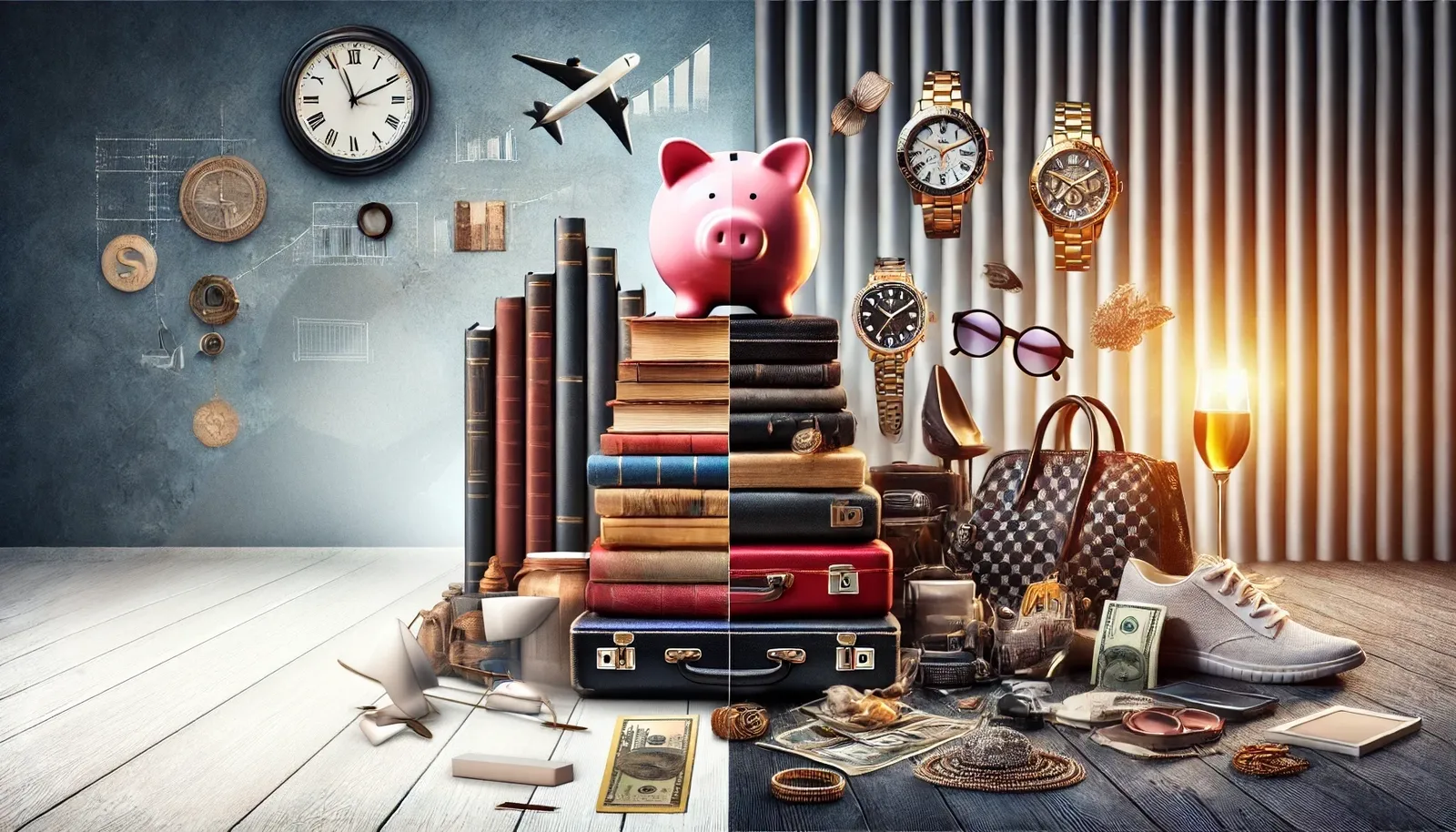Staying Poor is a Choice: The Mindset Behind Wealth
 When I was in college, my mom gave me Donald Trump’s book How to Get Rich as a graduation present. This was a decade before Trump got into politics so the general populace wasn't yet allergic to him. And let's be honest, regardless of what you think of him as a politician, he does know a thing or two about real estate and business. However, it wasn't the content of this book that stood out to me, but the interaction this book triggered. A friend, seeing the book in my room, once asked, “Do you really think Trump wants more rich people?”
When I was in college, my mom gave me Donald Trump’s book How to Get Rich as a graduation present. This was a decade before Trump got into politics so the general populace wasn't yet allergic to him. And let's be honest, regardless of what you think of him as a politician, he does know a thing or two about real estate and business. However, it wasn't the content of this book that stood out to me, but the interaction this book triggered. A friend, seeing the book in my room, once asked, “Do you really think Trump wants more rich people?”
At first, I hesitated. The question carried the implication that the wealthy guard their secrets, reluctant to create competition. Back then, this sentiment seemed reasonable to me. But in hindsight, I realize this mindset was what delayed my progress. It reflected the scarcity thinking that often defines a poor mindset - one that views life through a zero-sum lens.
The truth? Those who’ve achieved significant wealth - do want others to succeed. Not out of altruism, but because it builds their network of alliances, it builds their own world of opportunities. In other words, even if Trump doesn't benefit directly from you getting rich, he benefits from the growth of US economy that you're contributing to, potential partnerships you form with his existing network, and from inventions you come up with. There is no benefit to him in keeping you poor, but there is future benefit to empowering you. This mindset isn’t just about money; it influences how we approach collaboration, competition, and self-improvement. Rich people were not the ones gatekeeping me from becoming wealthy, my own friends with poor mindset sowing doubt into my head were.
In the Book Secrets of The Millionaire Mind, Bret Harv delves deeply into these "rich vs poor" behavior contrasts. He explains how people with poor mindset sabotage themselves through their actions, beliefs, and friends they choose to associate with (you're the average of the 5 people you spend the most time with). The rich, on the other hand, use those as levers to get ahead in life. They dedicate their life to building a network of synergies, those synergies range from skillsets to assets and connections.
In this blog post, I will employ a similar format to Bret Harv's book to contrast some behaviors I saw in myself, friends, and colleagues over the years and how they've helped me grow through introspection.
Competition vs Collaboration
 At a corporate event over a decade ago, we played Red-Black team-building game designed to simulate competition and collaboration. The participants were split into teams of 4. Each team was given two cards: red and black. The scoring system for each round was as follows:
At a corporate event over a decade ago, we played Red-Black team-building game designed to simulate competition and collaboration. The participants were split into teams of 4. Each team was given two cards: red and black. The scoring system for each round was as follows:
- If all teams play "Black" (Cooperate): Everyone gets a moderate reward.
- If one team plays "Red" (Compete) and others play "Black": The "Red" team gets a large reward, and the "Black" teams are penalized.
- If all teams play "Red": Everyone is penalized significantly.
The goal of the game is to maximize the score your team obtains at the end of the game, after 10+ rounds. The teams do not communicate directly but some variations of the game allow teams to send "delegates" to deliver messages between teams. Naturally, the delegate can be used both to collaborate with other teams as well as to deceive. This aspect creates an aura of distrust between the teams due to "us vs them" mentality and competing interests similar to that of Prisoner's Dilemma. Even with the most collaborative teams, eventually one of the teams decides to cheat to get ahead. Once that happens, trust is broken with the other teams, even if the team in question doesn't repeat the same mistake.
What's even more revealing, however, is the evaluation exercise that happens after the game. Turns out that the most boring scenario, where every team always votes black and never receives additional rewards ends up outperforming not just on overall score, but most of the time on individual team scores as well. In other words, by optimizing for the greater good, your team ends up getting a higher independent score as well.
This game reflected the broader patterns of a poor vs rich mindset when it comes to collaboration:
- Poor mindset focuses on immediate, personal gain. This mindset sees the world through a zero-sum lens. In zero-sum games the only way to get ahead is to sabotage someone else. In zero-sum games we spend more of our resources enforcing "fairness" than on productive tasks.
- Rich mindset seeks collaboration and mutual benefit, knowing that long-term success is built on strong partnerships. Rather than seeking to grab the biggest slice of the pie, rich mindset focuses on growing the size of the pie.
Poor mindset is akin to a cancer cell leeching resources from the body to grow faster than the neighboring cells. The body can support a single cancer cell, but if enough of them accumulate, the body eventually dies, and the cancer cells die with it. If, on the other hand, the cell performs its duty and trusts that the rest of the body will take care of it, the same cell ends up living longer than if it was a cancer cell in a dying body.
Peacock Mentality vs Productivity Mentality
 A while back I was giving a ride to a frugally-dressed friend. This friend owns a real estate portfolio making over $100k/month. He was riding shotgun, while two other friends unrelated to him were in the back seat. After the frugally-dressed friend left the car, the two other friends proceeded to make fun of his attire.
A while back I was giving a ride to a frugally-dressed friend. This friend owns a real estate portfolio making over $100k/month. He was riding shotgun, while two other friends unrelated to him were in the back seat. After the frugally-dressed friend left the car, the two other friends proceeded to make fun of his attire.
These other friends earned only a fraction of what the friend who left earned, they lived paycheck-to-paycheck (one of them couldn't even afford to live in Boston), but they had strong opinions about what a millionaire should look like. In their mind more money meant more status symbols that others should immediately be able to recognize. The frugal friend didn't care about status symbols, he cared about his comfort and productivity. His money was buying him time, not Veblen goods.
This resonates with a tweet that Alex Hormozi posted earlier this year:
If you want to impress poor people, outspend them.
If you want to impress rich people. outwork them.
The original tweet can be found here. This tweet highlights the same difference in mentality as my example:
- Poor mindset spends on status symbols in order to appear rich front of their peers (peacock mentality).
- Rich mindset does not play status games, they instead focus on optimizing their productivity. They may buy expensive items, but those items either improve their productivity or save time.
I already explored this concept before in an article where I examined behaviors of a tenant who got evicted because she prioritized owning a Porsche over paying her rent. It's easy to dismiss this example due to its absurdity, but how often do you exhibit a milder version of the same behavior? Maybe it’s upgrading to a newer phone when the old one still works well, or stretching a budget to buy designer clothes you don’t need, just to "feel" successful. These are subtler examples of the same peacock mentality - sacrificing long-term stability for short-term gratification or status.
Being Wealthy vs Being Rich
There are a couple more examples I wanted to point out but since this post is getting long, I will save them for another time. Before ending this post, however, I want to point out a nuance I've come to understand with time about the difference in being rich vs being wealthy:
- Being rich is the ability to buy expensive things, this ability is not permanent
- Being wealthy is the wisdom to buy the right things (assets rather than liabilities) that keep your wealth from eroding
Wealth is a mindset that stays with you even if you lose everything you own. It's a skillset that allows you build back from nothing even in the event of bankruptcy. Many billionaires (Alex Hormozi and Donald Trump included) lost everything at some point in their lives and were able to rebuild their businesses even faster the second time around.
Those with the poor mindset, on the other hand, eventually end up with nothing even if they are lucky enough to have money land into their hands through lottery, inheritance, or marriage. Jim Rohn pointed out the same concept in his lectures by saying "If someone hands you a million dollars, best you become a millionaire, or you won't get to keep the money."
We can think of life as a large lake, with rock representing the poor mindset, and bubble representing the rich mindset. Regardless of where the rock starts out, it will always end up at the bottom of the lake. Regardless of where the bubble starts out, it will always end up at the top. We saw the same concept play out with inflation during COVID. Government issued a lot of subsidies aimed at those who were hit hardest by the pandemic (the poor), yet the ones who ultimately benefitted from those subsidies were the business owners and landlords.